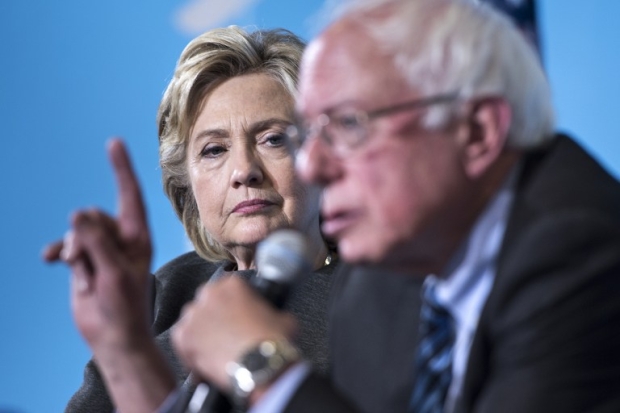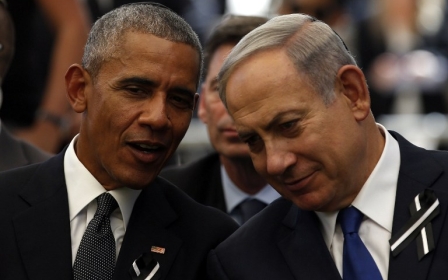
No matter who wins the US election, the door stays shut to Palestinians
Presidential elections offer a brief but critical window to examine the different and often competing visions over which direction the country should take regarding the economy, foreign policy, and key domestic issues. The 2016 presidential elections are perhaps the most divisive in the country’s modern history, a probable consequence of the extreme polarisation between the Republican and Democratic parties.
What will be the implications of a Trump or Clinton administration on Palestine and the Palestinians?
Despite these rising tensions, in the realm of foreign policy, the approach to Israel, Palestine and the Palestinians is arguably one of the most inflexible and entrenched positions in Washington.
While there are differences between the parties’ beliefs on how to achieve their objectives, Democrats and Republicans share a common vision: Israel is to be provided with unconditional financial, military and diplomatic support, Palestine is a word that is rarely (if ever) articulated publicly or addressed substantially, and the Palestinians - their lives, concerns, and rights - are invisibilised and, if recognised, only so in the shadow of Israel’s security interests.
Nevertheless, the current race to the Oval Office has been one that has defied most expectations and understandings of the workings of US politics. Against the backdrop of a US that is reorienting its strategic gaze from the Middle East, what will be the implications of a Trump or Clinton administration on Palestine and the Palestinians?
A shared vision: Trump, Netanyahu and the GOP
In February, Donald Trump attracted much attention when he broke from decades of zealous Republican commitment to Israel by promising to be a “neutral” negotiator in the Palestinian-Israeli peace process. As Trump’s popularity kept rising regardless of taking such an atypical stance on Palestine and Israel, he caught the attention of key Republican donors like Sheldon Adelson, a longtime supporter of America’s special relationship with Israel.
In December 2015, in the heat of the primary battle, Adelson and Trump met privately. Soon after, Trump eagerly told Reuters, that "Sheldon knows that nobody will be more loyal to Israel than Donald Trump."
Trump continued to fall back in line with traditional Republican positions on Israel and Palestine when in March 2016, during his address to AIPAC, he referred to Hamas as the “Palestinian ISIS”, denounced the United Nations as not being “a friend to freedom” or a capable intermediary, promised to immediately invite Netanyahu to the Oval Office and swiftly move the American embassy to “the eternal capital of the Jewish people, Jerusalem.”
Throughout his entire speech, Trump only referred to Palestinians within the framework of terrorism. With respect to the contours of any future peace deal, he said that the Palestinians “must come to the table knowing that the bond between the United States and Israel is absolutely totally unbreakable. They must come to the table willing and able to stop the terror being committed on a daily basis against Israel. They must do that. And they must come to the table willing to accept that Israel is a Jewish state and it will forever exist as a Jewish state.”
And while Trump’s speech hit most of the standard Republican notes, his use of the word “Palestine” drew the ire of his rival Ted Cruz, who evoked cheers from the audience when he started his speech by insisting that “perhaps to the surprise of a previous speaker, Palestine has not existed since 1948”.
It is that comment that perhaps best captures the GOP’s approach to Palestine - even its mention is considered blasphemous. This is evidenced with their 2016 platform that no longer calls for the two-state solution and boldly signals to international organisations like the UN that the GOP opposes “any measures intended to impose an agreement or to dictate borders or other terms and we call for the immediate termination of all US funding of any entity that attempts to do so”.
It is that comment that perhaps best captures the GOP’s approach to Palestine - even its mention is considered blasphemous
The platform also recognises Jerusalem as the “eternal and indivisible capital” of Israel, calls for the US embassy to be moved there, insists on maintaining Israel’s Qualitative Military Edge, and identifies the Boycott, Divestment and Sanctions (BDS) movement as “anti-Semitic” in nature with the intention of “destroying Israel”.
Should Trump lose the election, the positions of the GOP on Israel are clear and will mean that on the legislative level, it will strongly back Netanyahu’s policies regardless of their costs to Palestinians or the fragile state of the peace process. This should come as no surprise, given Netanyahu’s particular dedication to tightly aligning the GOP with Israel.
Indeed, the shared vision between Netanyahu and the GOP is not limited to policies in Palestine and Israel; as Trump continuously points out, Israel epitomises the success of some of his controversial propositions on profiling and immigration control.
For instance, in the wake of the Orlando shootings, Trump supported his suggestion that the US adopt profiling to thwart terrorist attacks by citing Israel as a country that does it “successfully”.
Consequently, a Trump presidency would be focused on providing unconditional support for Netanyahu. But delving deeper, the compatibility between Trump and Netanyahu points to very similar outlooks on national security, immigration, and racial and religious profiling.
Democrats: Hillary Clinton, a fragmented party and an inflexible vision
Ted Cruz was not the only presidential hopeful to challenge Trump on his less fervent commitment to Israel. In the morning before either Republican candidate’s speech to AIPAC, Hillary Clinton indirectly referenced Trump’s changing position and denounced the possibility of neutrality on the issue of Israel and Palestine.
As emphasised on her campaign site, Clinton has made a point to advertise her firm support for Israel and amity with Netanyahu. On the security front, Clinton promises to increase support for defence systems like Iron Dome and David’s Sling and renew the US-Israel Memorandum of Understanding, “providing a 10-year US commitment to provide Israel with the security assistance it needs to maintain the most capable military in the Middle East.”Like Trump, Clinton also pledges to thwart any attempts to isolate or weaken Israel’s standing in the diplomatic arena. With regards to the peace process, Clinton visibly distances herself from any position of impartiality by affirming that, while she supports a two-state solution, the angle of a Clinton presidency will be to “partner with Israel to advance the two-state vision of a Jewish and democratic Israel with secure and recognised borders”.
For a two-state vision, there is only reference to partnering with Israel, a complete elision of Palestinian rights and expectations, and despite the different communities living inside any such state, a focus on an exclusive ethnic and religious identity to Israel.
A party divided?
While such rhetoric and posturing closely resembles that of her Republican rival, Hillary Clinton’s approach to the Palestinians was a divisive issue in the Democratic primaries. Bernie Sanders, leading an anti-establishment movement, publicly challenged Clinton’s AIPAC speech and general approach to Israel and Palestine in the Democratic debates in April.
Ultimately, it was an exchange that forced a conversation on and recognition of the suffering, aspirations and dignity of the Palestinian people. In it, Sanders insisted on highlighting the biased role that the US is playing, the carte blanche given to Netanyahu, and the detrimental consequences such a “one-sided” approach is having on the peace process.
After Sanders criticised Clinton for failing to refer to the Palestinians in her AIPAC speech, Clinton openly acknowledged Palestinian concerns and reluctantly acknowledged that an agreement would have to be fair to both the Israelis and the Palestinians. Nevertheless, she maintained that it would have to be dependent on Israel’s security.
Such language is troubling. It dehumanises those living in Gaza, fails to recognise that Israel’s military withdrawal from Gaza did not end its control of Gaza’s economy and vital resources such as water and electricity, and puts the onus for Palestinian suffering on the Palestinians themselves. It echoes Clinton’s rigid defence of Israel’s policies in the Gaza War during Jon Stewart’s the Daily Show, revealing a pattern in legitimising and justifying any Israeli policy, regardless of its impact on Palestinians.
Cornel West passionately argued that '[Israel’s security] can never be predicated on an occupation of precious Palestinians... wrestling with occupation for 50-some years, demeaned, devalued, dominated, exploited'
Sanders would continue to advance his progressive objectives for Palestine by appointing three pro-Palestinian figures to the Democratic platform committee - Cornel West, James Zogby and US Rep Keith Ellison (D-Minn).
The move beyond rhetorical support for Palestinians to giving Palestinian voices a seat at the table sparked hope that the Democratic Party could witness an historic change regarding its approach towards the Palestinians and Palestine. Sanders’ camp tried to broaden the conversation beyond the unconditional support of Israel and ended up fiercely fighting over “occupation and settlements.” In a fiery debate with Robert Wexler, a Clinton surrogate, Cornel West passionately argued that "[Israel’s security] can never be predicated on an occupation of precious Palestinians... wrestling with occupation for 50-some years, demeaned, devalued, dominated, exploited.”
But Clinton’s uncompromising commitment won out in the final platform. And while the platform incorporates more progressive stances on issues pertaining to immigration reform, racial justice and prison reform, it maintains a similar outlook to the Republican platform on Israel, Palestine and the Palestinians.
One major difference is that the Democratic platform commits itself to a two-state solution. But despite using more opaque language, the rest of the platform is pretty similar to the GOP’s regarding Israel. It calls for Jerusalem to remain as the capital, a commitment to retaining Israel’s Qualitative Military Edge, and staunch opposition to any effort to delegitimise Israel, including at the UN or through BDS.
The platform reflects the rigidity of Clinton’s stance, the unwillingness of the Democratic National Committee to incorporate dissenting voices on Israel, Palestine, and the Palestinians, and the limited capacity of progressive actors on these issues to effectively transform the party’s inelastic approach.
Moreover, as the presidential election has intensified and the fear of Trump heightened, Clinton has faced less criticism from progressives within the party and has been given more leeway to advance her current positions and move further to the right, especially on matters of foreign policy. These factors, combined with the relative absence of any substantial conversation on Israel, Palestine, or the Palestinians in the national election, signal a need to be cautious about any optimism fostered during the Democratic primaries for the party’s policies towards Palestinians.
Vision for Palestine decided by everyone - but Palestinians
In the midst of the chaos surrounding the 2016 presidential saga, the differences between the expertise and rhetoric of Hillary Clinton and Donald Trump could not be greater. The split is so profound that Clinton has used Trump’s intolerant rhetoric and anti-immigration positions to paint him as antagonistic to American values. Beyond their cults of personality, the candidates’ ideological clashes are also reflected in their respective parties’ general strategies and aspirations for the country’s future.
Yet while the parties and their candidates have opposing perspectives on the prison system, immigration, and the economy, they share a common vision for Israel, Palestine and the Palestinians.
As both candidates paint one another as occupying opposite ends of the political spectrum, their shared embrace of Netanyahu’s vision exposes the contradictions in the Democratic Party as well as the growing ideological parallels between the GOP and Israel's attitudes towards forced detention, militarised borders, profiling, and a general shift to the right.
Clinton and Trump's common vision is one that is tightly aligned with that of Netayanhu
Trump has already pointed to Clinton’s double standards. “Hillary Clinton said that it is OK to ban Muslims from Israel by building a WALL, but not OK to do so in the US. We must be vigilant!” he tweeted. It is a moral and ideological inconsistency that progressive Democrats have also raised, albeit for different purposes.
As Rosario Dawson, a prominent Sanders spokesperson, asked: “Trump is a horrible person because he wants to put a wall between [the US] and Mexico. But that’s okay with [Hillary] when Netanyahu says he wants to do that between Israelis and Palestinians?”
In light of these developments, the following implications and recommendations are offered:
1) Netanyahu has carte blanche:
Both presidential candidates have articulated their unwavering support for Israel and presented themselves as being the right choice to “fix” the relationship impaired under Obama. And while the rhetoric from Clinton or Trump differs slightly from that of Obama, the implications of such continuous unconditional support can be seen with the recent expansion of Israeli settlements shortly after finalising a $38bn package of military aid. As Mark Toner, the State Department’s deputy spokesperson, stated, the consequences of such actions will result in “cementing a one-state reality of perpetual occupation”.
2) Growing contradictions between the US’s domestic and foreign policies leave spaces for grassroots movements:
As issues of racial justice and immigration reform become greater priorities on the US domestic agenda, Israel's continued rightward path and support of walls, settlements, racial profiling and the prison industrial complex will widen the ideological ties between marginalised communities in the US and those in Israel and Palestine, while intensifying the links between Israel and the GOP.
3) A continued one-sided approach to a two-sided issue:
Calls for a Palestinian state by the next president should be taken with extreme caution and skepticism. Neither candidate aspires to be a neutral party or an honest broker for peace. Moreover, both Trump and Clinton are adamant that any conversations on Palestinian statehood can only happen - and should only happen - in accordance with Israel’s interests. In any such process, the needs of the Palestinians are considered secondary and the contours of any future Palestinian state will be determined by Israel, not the Palestinians themselves.
- Fadi Nicholas Nassar is a Doctoral Fellow at the Geneva Centre for Security Policy focusing on international mediation, peace-keeping, conflict resolution, and post-conflict reconstruction and a policy analyst at Al-Shabaka: The Palestinian Policy Network. He started his academic journey with a Bachelor of Science in Foreign Service and a certificate in Islam and Muslim-Christian Relations from Georgetown University. He also holds a Master of Public Administration with a concentration on international conflict resolution from Columbia University as well as a Master of Philosophy in War Studies from King's College London, where he is currently completing his PhD. His current research is directed towards understanding the limitations and possibilities for UN mediation in civil wars. At different capacities, Fadi has worked with the United Nations Development Programme in Lebanon as well as in Peru, the Holy See’s Mission to the United Nations in Geneva, and the Carnegie Endowment for International Peace in Lebanon. He has also written for Univision and his articles can be found in English and Spanish.
The views expressed in this article belong to the author and do not necessarily reflect the editorial policy of Middle East Eye.
Photo: Palestinians children who were made homeless following Israeli army summer's military fierce offensive on the Gaza Strip walk the mobile homes donated by the United Arab Emirates, on 1 October 2014, in Khan Yunis' Khuzaa neighbourhood in the southern Gaza Strip (AFP)
New MEE newsletter: Jerusalem Dispatch
Sign up to get the latest insights and analysis on Israel-Palestine, alongside Turkey Unpacked and other MEE newsletters
Middle East Eye delivers independent and unrivalled coverage and analysis of the Middle East, North Africa and beyond. To learn more about republishing this content and the associated fees, please fill out this form. More about MEE can be found here.








